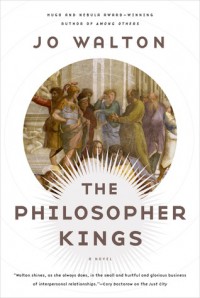Reflections
Eager reader of history, mystery, classics, biographies, steampunk, lit fic, science, scifi, and etc. My reviews are mostly positive--I rarely finish or write about books I don't enjoy. My TBR is too high for that.
Time travel, robots, Greek gods, Atlantis, and Plato’s Republic, part II

After the community riving debate at the end of the previous book, the goddess Athena has gone off in a huff, taking most of the futuristic robot workers with her, and the Just City--her philosophical experiment based on Plato’s Republic--is fragmenting into factions. Some groups want to follow Plato’s strictures differently or even more closely, others are allying themselves with Sokrates or blending Plato’s ideas with religious beliefs, and they all are skirmishing violently over the museum quality artwork that Athena had “rescued” from the dustbins of history and installed in her Just City project to enhance the souls of its citizens, a tragically ironic miscalculation. As The Philosopher Kings opens, my favorite character from the first book is dying, shot by an arrow in one of the battles over art.
The Philosopher Kings is the sequel to The Just City (my review here), and you would definitely want to start at the beginning of Jo Walton’s Thessaly trilogy before jumping into this continuation of the story. In the first book, when Athena decides to try creating the ideal city that Plato describes in his Republic dialogue, she time-travels interested people from throughout history (from far into our future to deep into our past) and sets them up on the isolated island of Atlantis sometime before the Trojan War, knowing the site will later be destroyed by a volcano so that nothing they do will interfere with any already determined chains of events. Apollo joins her, taking on mortal form to be part of her Just City experiment, because even being a god is limiting in its way and he knows he has things to learn. As a human Apollo is both incredibly talented and clumsily clueless.
Apollo is back as a narrator in the second book, and so is Maia, an earnest, hardworking intellectual sort, who had been deeply frustrated by the many restrictions placed on women in Victorian England before Athena brought her to the Just City when she was 19 years old, but deeply philosophical Simmea dies in the book’s first few pages after being wounded in the ongoing battles over artwork. Simmea began life on a farm in ancient Egypt and was then sold into slavery before being brought to the Just City as a ten-year-old, and she has been grateful for the goddess-given opportunity to become her best self. Fortunately Simmea’s place as a narrator is taken by her teenage daughter Arete, a young woman coping with the mostly wonderful but unsettling secret of her parentage--her father Apollo is a god, which allows her the possibility of becoming a hero like Hercules, maybe the first female hero.
Because they aren’t supposed to interfere with history, most Just City citizens had stayed close to their settlement on Atlantis, but after Simmea’s death they decide to make a voyage of discovery, goodwill, and possible revenge, since there are those, Apollo among them, who believe the attack on Simmea must have come from outside. Much of the book is taken up with this epic trip around the islands of the Mediterranean. The voyagers aren’t sure exactly when in time they are, and the primitive, non-philosophical lives of the pre-Trojan War people they first encounter stun them. There is much debate about whether it would be better to help those people or leave them alone.
This sequel thrilled and gripped me as much as the first book did. It’s a novel full of ideas and action, but it’s the characters that bring the story to life. They each have sincere and strong, but often clashing ideas about how to create a Plato inspired community, and now their opinions are further challenged by what they find on the voyage. I could especially relate to their feelings of dislocation out in the “real world”. Coming of age in the late 1960’s, early 1970’s, an era when we questioned everything, I was eager to pick apart my hidden (and probably mistaken) axioms of belief. To that end I attended St. John’s College in Annapolis, Maryland where we sought Truth, or maybe just truth, by reading, discussing, and arguing over “the Great Books”, from Homer and Euclid to Tolstoy, Marx, and Einstein (yes, it was a European male dominated list, something the school has rectified somewhat since.) Over summer and winter breaks it was always a disconcerting shock to discover that there were people, even among our friends and family, who didn’t care enough about Plato to have his dialogues be a constant topic of even casual conversations.
The third book in this series won’t be out for a while, on her blog Jo Walton said Summer 2016 at the earliest, but I await it eagerly. It looks like it may be set far into the future, and if so I’m sure Athena’s Just City experiment will have many new and interesting challenges.
 20
20
 8
8


